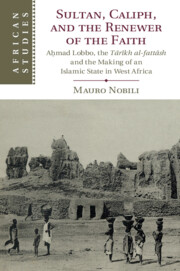 Sultan, Caliph, and the Renewer of the Faith
Sultan, Caliph, and the Renewer of the Faith Book contents
- Sultan, Caliph, and the Renewer of the Faith
- African Studies Series
- Sultan, Caliph, and the Renewer of the Faith
- Copyright page
- Dedication
- Contents
- Figures
- Maps
- Tables
- Acknowledgments
- Notes on Orthography and Other Conventions
- Introduction
- Part I A Nineteenth-Century Chronicle in Support of the Caliphate of Ḥamdallāhi: Nūḥ b. al-Ṭāhir’s Tārīkh al-fattāsh
- Part II A Contested Space of Competing Claims
- 3 The Emergence of Clerical Rule in the Middle Niger
- 4 Aḥmad Lobbo, Timbuktu, and the Kunta
- 5 Fluctuating Diplomacy: Ḥamdallāhi and Sokoto
- Part III The Circulation and Reception of the Tārīkh al-fattāsh, 1840s–2010s
- Index
- African Studies Series
5 - Fluctuating Diplomacy: Ḥamdallāhi and Sokoto
from Part II - A Contested Space of Competing Claims
Published online by Cambridge University Press: 28 February 2020
- Sultan, Caliph, and the Renewer of the Faith
- African Studies Series
- Sultan, Caliph, and the Renewer of the Faith
- Copyright page
- Dedication
- Contents
- Figures
- Maps
- Tables
- Acknowledgments
- Notes on Orthography and Other Conventions
- Introduction
- Part I A Nineteenth-Century Chronicle in Support of the Caliphate of Ḥamdallāhi: Nūḥ b. al-Ṭāhir’s Tārīkh al-fattāsh
- Part II A Contested Space of Competing Claims
- 3 The Emergence of Clerical Rule in the Middle Niger
- 4 Aḥmad Lobbo, Timbuktu, and the Kunta
- 5 Fluctuating Diplomacy: Ḥamdallāhi and Sokoto
- Part III The Circulation and Reception of the Tārīkh al-fattāsh, 1840s–2010s
- Index
- African Studies Series
Summary
This chapter follows the fluctuating relationship between the caliphates of Ḥamdallāhi and Sokoto, which moved from being amicable to tense, then regularized, and eventually tense again in the late 1840s-1840s. It shows that the Fodiawa leaders of Sokoto constantly questioned the role of Aḥmad Lobbo as both a religious and political authority, even claiming sovereignty over Ḥamdallāhi. This tension took the shape of dialectical disputes over Aḥmad Lobbo’s claims to rule a sovereign Islamic state independent from Sokoto. The Tārīkh al-fattāsh, a political project disguised as a historical work, took shape in the 1840s as response to these challenges.
Keywords
- Type
- Chapter
- Information
- Sultan, Caliph, and the Renewer of the FaithAhmad Lobbo, the <I>Tārīkh al-fattāsh</I> and the Making of an Islamic State in West Africa, pp. 182 - 202Publisher: Cambridge University PressPrint publication year: 2020
